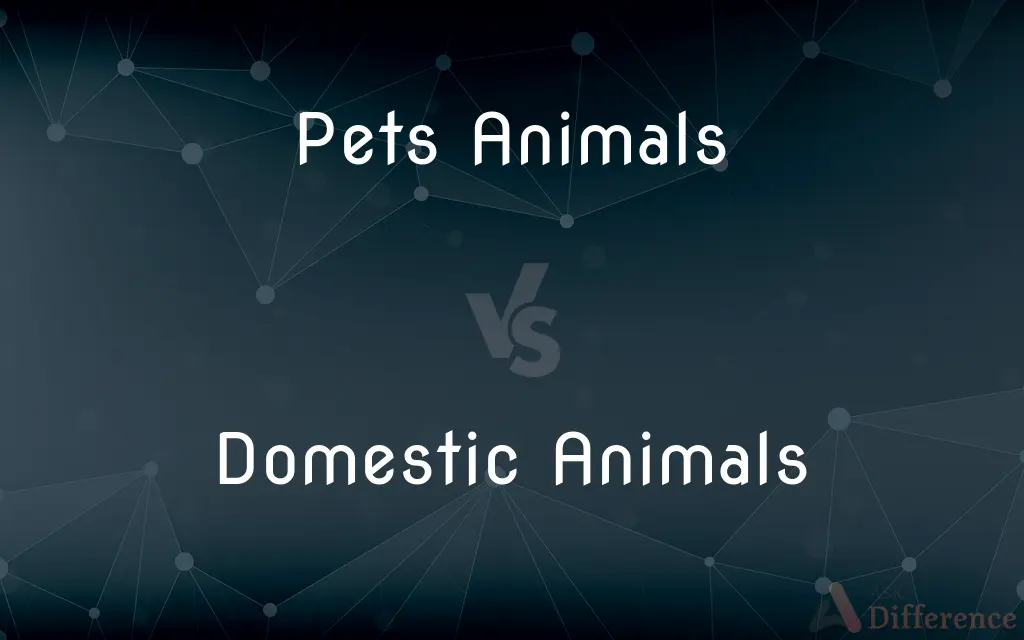Pets Animals vs. Domestic Animals — What's the Difference?
Edited by Tayyaba Rehman — By Fiza Rafique — Published on December 19, 2023
Pets Animals are animals kept for companionship, while Domestic Animals are animals tamed and bred for work, food, or companionship.

Difference Between Pets Animals and Domestic Animals
Table of Contents
ADVERTISEMENT
Key Differences
Pets Animals primarily refer to animals that humans keep for the primary purpose of companionship and emotional fulfillment. From dogs and cats to parrots and hamsters, these creatures are cherished and often treated as family members. Domestic Animals, on the other hand, encompass a broader category, including animals that humans have tamed and bred for various reasons over thousands of years.
While both Pets Animals and Domestic Animals live in close association with humans, their roles and purposes can differ. Pets Animals, like guinea pigs or tropical fish, are not necessarily used for any practical purpose beyond pleasure and companionship. In contrast, Domestic Animals such as cows and chickens might be kept for food production, while horses were historically kept for transportation and labor.
It's important to note that not all Domestic Animals are Pets Animals, but all Pets Animals can be considered domesticated. For instance, a dairy cow is a domesticated animal but not typically a pet. Conversely, a house cat is both a pet and a domesticated animal.
Lastly, the relationship humans have with Pets Animals often centers around emotional and psychological benefits, leading to deep bonds and attachments. With Domestic Animals, while affectionate bonds can still form, the relationship might also encompass economic, agricultural, or work-related benefits.
Comparison Chart
Primary Purpose
Companionship
Work, food, or companionship
ADVERTISEMENT
Scope
Subset of domesticated animals
Includes both pets and animals used for other human benefits
Bond with Humans
Emotional and psychological benefits
Can be economic, agricultural, or emotional
Examples
Dogs, cats, parrots
Cows, chickens, horses, dogs, cats
Historical Context
Historically cherished as companions
Historically tamed for various purposes including labor and food
Compare with Definitions
Pets Animals
Non-human companions living in households.
Many consider their Pets Animals as part of their family.
Domestic Animals
Creatures kept for work, food, or pleasure.
Goats, as Domestic Animals, provide milk and cheese.
Pets Animals
Animals that provide emotional and psychological comfort.
After a stressful day, spending time with her Pets Animals helps her relax.
Domestic Animals
Tamed creatures forming part of human households or industries.
The farmer's collection of Domestic Animals included sheep and pigs.
Pets Animals
Tamed creatures primarily for pleasure and bonding.
Children often learn responsibility by caring for Pets Animals.
Domestic Animals
Animals serving human needs beyond just companionship.
Chickens, as Domestic Animals, supply eggs and meat.
Pets Animals
Creatures cherished for emotional fulfillment.
His aquarium of tropical fish are his beloved Pets Animals.
Domestic Animals
Species adapted to live in close association with humans.
Dogs have been Domestic Animals for thousands of years.
Pets Animals
Animals kept for human companionship.
She adopted two rabbits as Pets Animals to keep her company.
Domestic Animals
Animals bred and tamed for human use or companionship.
Horses, once crucial for transportation, are Domestic Animals.
Common Curiosities
What's the primary reason people keep Pets Animals?
Primarily for companionship and emotional fulfillment.
Why were most Domestic Animals initially tamed?
For varied reasons including work, food, and companionship.
Are all Domestic Animals considered pets?
No, while all Pets Animals are domesticated, not all Domestic Animals are pets.
Can a Domestic Animal become a pet?
Yes, for example, some people keep chickens both for eggs and as Pets Animals.
What are the benefits of Domestic Animals in agriculture?
They can provide labor, wool, milk, meat, and other products.
Are Pets Animals always kept at home?
While most are household animals, some Pets Animals like horses might be kept in stables.
Which is broader in scope, Pets Animals or Domestic Animals?
Domestic Animals, as it includes all tamed animals for various human purposes.
Which Domestic Animals have been essential in history?
Animals like horses, oxen, and camels have been vital for transportation and labor.
Can wild animals be considered Pets Animals?
Generally, wild animals are not suitable or safe as pets, though some people attempt to keep them.
How do Pets Animals affect human well-being?
They can provide emotional support, reduce stress, and offer companionship.
Can a pet provide the same benefits as other Domestic Animals?
While pets offer emotional benefits, other Domestic Animals can also provide economic or work-related benefits.
Is there any overlap between Pets Animals and Domestic Animals?
Yes, animals like dogs can be both pets and work animals.
How long have humans been keeping Pets Animals?
For thousands of years, with dogs being among the first.
Do Domestic Animals always live with humans?
Not always, for example, many live on farms.
Are there laws governing the keeping of Pets Animals?
Yes, many jurisdictions have regulations concerning the welfare, breeding, and sale of Pets Animals.
Share Your Discovery

Previous Comparison
MLA vs. APA
Next Comparison
Homologous Structures vs. Analogous StructuresAuthor Spotlight
Written by
Fiza RafiqueFiza Rafique is a skilled content writer at AskDifference.com, where she meticulously refines and enhances written pieces. Drawing from her vast editorial expertise, Fiza ensures clarity, accuracy, and precision in every article. Passionate about language, she continually seeks to elevate the quality of content for readers worldwide.
Edited by
Tayyaba RehmanTayyaba Rehman is a distinguished writer, currently serving as a primary contributor to askdifference.com. As a researcher in semantics and etymology, Tayyaba's passion for the complexity of languages and their distinctions has found a perfect home on the platform. Tayyaba delves into the intricacies of language, distinguishing between commonly confused words and phrases, thereby providing clarity for readers worldwide.












































